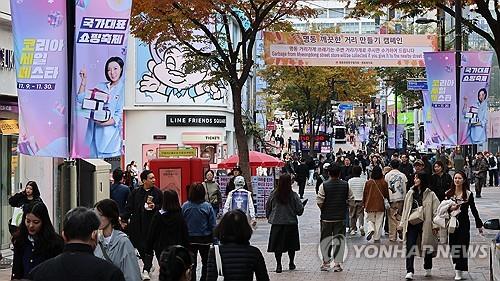- California Assembly OKs highest minimum wage in nation
- S. Korea unveils first graphic cigarette warnings
- US joins with South Korea, Japan in bid to deter North Korea
- LPGA golfer Chun In-gee finally back in action
- S. Korea won’t be top seed in final World Cup qualification round
- US men’s soccer misses 2nd straight Olympics
- US back on track in qualifying with 4-0 win over Guatemala
- High-intensity workout injuries spawn cottage industry
- CDC expands range of Zika mosquitoes into parts of Northeast
- Who knew? ‘The Walking Dead’ is helping families connect
Household income rises by most in 2023: data
South Korea’s household income advanced by the largest margin ever last year on the back of increasing wages and business income, data showed Monday.
The yearly average income per household stood at 71.85 million won (US$50,076) in 2023, up 6.3 percent from a year earlier, according to the data from Statistics Korea and the Bank of Korea.
It marks the sharpest on-year gain since the agency began compiling relevant data in 2011.
Income earned through wages increased 5.6 percent on-year to an average of 46.37 million won last year.
The average income from business operations also climbed 5.5 percent to 12.72 million won, and property income soared 28.1 percent to 5.59 million won in 2023, the data showed.

Meanwhile, the average debt of South Korean households fell for the first time ever over the past year due mainly to structural changes leading to the growth in their net assets.
Each household owed 91.28 million won on average to banks and other financial companies as of end-March, down 0.6 percent from a year earlier, according to the data.
The decline came as South Korea has seen a marked increase in the number of single-member households and households comprised of senior citizens, which relatively had a smaller amount of financial debts, according to officials.
An average South Korean household held 540.22 million won worth of assets as of end-March, up 2.5 percent from a year earlier.
Their net assets also rose 3.1 percent on-year to reach 448.94 million won, as financial assets went up 6.3 percent on-year to 133.78 million won, and property and other tangible assets gained 1.3 percent to 406.44 million won.
Households in the central administrative city of Sejong were found to have the largest amount of assets of 766.63 million won, followed by those in Seoul having 761.73 million won and the surrounding province of Gyeonggi with 669.45 million won, the data showed.











